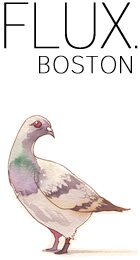Last month I had the pleasure of attending Art Basel in Switzerland, a jam-packed visit onto which I appended a multi-city excursion and an Icelandic stopover.
As you do.
And while I had an incredible time experiencing the grandfather of all art fairs firsthand and embarking on a spirit quest through the Alps, that’s a story for another day.
For now, I wanted to unpack some thoughts I had when I made the mistake of catching up on #bosarts news from afar.
It’s not that all the news was ‘bad’ per se, actually some of it was ‘good’, but it just felt like something was in the water last month. Or maybe something was in my water and I’m slowly dying of dysentery.
Either way, let’s leave June in June..
..by talking about it in July.
———————-
As you can probably detect, Boston has been riding high on a sea of ra-ra as of late, the final BostonCreates plan was unleashed on June 17th which was just in time for the Americans for the Arts Convention, June 17-19.
..But only a few days earlier on June 14th, Boston Globe arts writer Cate McQuaid announced that pages from the newspaper were being cut, including her galleries column which she has overseen for 20 years.
I’m not saying this is entirely a four horsemen scenario; Cate is alive and well, she will still write for the Globe, and she may even appreciate the opportunity to pursue other paths, but for some reason the decision itself, which was not prompted by her own desire to retire, struck a chord with me. It awakened and subsequently lassoed a slew of disparate thoughts in my head, which then snowballed into what has become this post.
And probably the next one too. (update: yes. pt. 2, 7/15)
Firstly, I find it frustrating when the arts are so often deemed expendable. As a discipline, they frequently draw the short straw: in schools, in coverage, in funding..remember when the MBTA cancelled the Green Line Extension public art projects just last year in a move that saved them <.1% of their budget?
Couldn’t we possibly tone down Deflategate & Pizza Rat-esque coverage in the Globe to ensure that there is room for a local artist or gallery to be recognized for their efforts, and feel like, through action, that this is actually a city that wants them to live and do business here?

We’re not talking about a small community paper, The Boston Globe is a big deal, so this news is a big loss; the visibility, the reputation, and the name alone has been a feather in artists’ caps since 1872. I can’t even tell you how many people I’ve known over the years who have descended upon newsstands to pick up 100 copies of a Globe where their names were merely hiccuped and/or misspelt in an article.
I’m certainly one of them.
Dan Kennedy of Media Nation wrote about the Globe cuts on his site. And Rebecca Ostriker, arts editor at the Globe, responded shortly after in order to clear the air about what she deemed to be misleading information.
You can read her full response here.
However, in an act of writer’s inception, I feel as though THAT response is even more misleading than the initial commentary she had intended to clarify.
Her opening paragraph is spent lauding the Globe’s “outstanding/superb/PulitzerPrizeWinning/powerhouse/sparkling” work (sure thing, all true), but then the second paragraph, where the heart of the issue should be addressed, vaguely references ‘shifting freelance focus’ accompanied by the following PR soundbite:
“We’re looking to tell the most compelling stories that will appeal to readers in every area of the arts. We are encouraging artists, performers, and arts organizations of all kinds to share their best ideas for feature stories with us. And we will be counting on all of our terrific freelance writers to help us tell those stories.”
Wait, but aren’t we cutting the arts..cover..ugh. #shortstraw
She might as well have said, “heywhatsthatoverthere?” while spontaneously bursting into a cloud outline of her former self.
And I can appreciate that Rebecca, who seems like a lovely person from what I can tell on the internet, is in a tough spot, having to be the face of an issue and an organization, diffusing a bomb she may not have necessarily lit, but even this glossy response speaks to a larger issue I’ve been mulling over lately..
It feels as though the bravado which accompanies larger endeavors and decisions is drowning out the voice of true, tangible, and personally felt issues that are directly facing our community. Or maybe that’s the point.
And while I realize it’s not nearly as pleasant, sometimes we just need to put down the fucking pom-poms.
The implications of reduced arts coverage in the Globe have reverberations that are felt above and beyond the boundaries of the printed word, this decision directly impacts and disrupts the fabric of our already fragile arts ecosystem.
From my perspective as an independent curator, I work alongside artists and venues for months on end attempting to pull together an exciting and cohesive show that is something I think you’d enjoy seeing, and something that artists can be proud of participating in. Lots of time, money, and energy are put into bringing exhibitions to life. So if we are making cuts to arts coverage, why as a curator, would I feel inclined to organize a show in Boston, and drag artists along with me, on a journey that no one would know about? Why should artists continue to live in a place that runs on ‘opportunity’ and ‘exposure’ as currency, when even that well is drying up and they can’t afford to pay their offensively high rents?
If an art show happens in a gallery, and no one is around to write about it, does it make a sound?
Ending on an Anecdote
When people ask me to describe arts coverage in Boston, I half-jokingly explain there is one woman who writes for the Globe and holds down the fort for an entire city.
This is probably surprising coming from someone who..is currently sharing these thoughts on her own local arts coverage site and is friends with the Greg Cooks, Artscopes, and Big Red and Shinys of our city, but I think we can all agree that Cate has been a bit of a North Star, a constant presence in a storm of magazines coming and going, galleries opening and shuttering, and websites thriving and fading.
She has always been a fair and objective critic; she doesn’t fawn for fun, nor knock you out for bloodsport.
You won’t see her at First Fridays; she does her work quietly, thoughtfully, and with a great deal of heart.
To lose even a syllable of arts coverage, especially hers, in Boston is a blow to everyone and makes all of our hard work feel a bit more futile.








